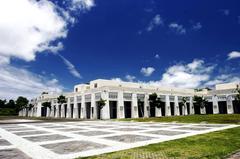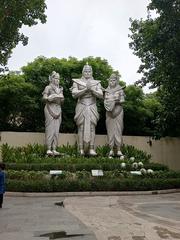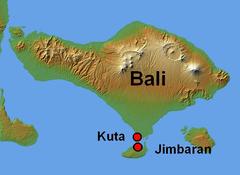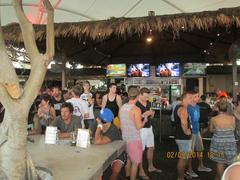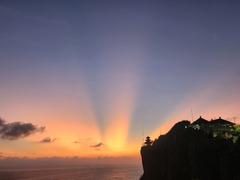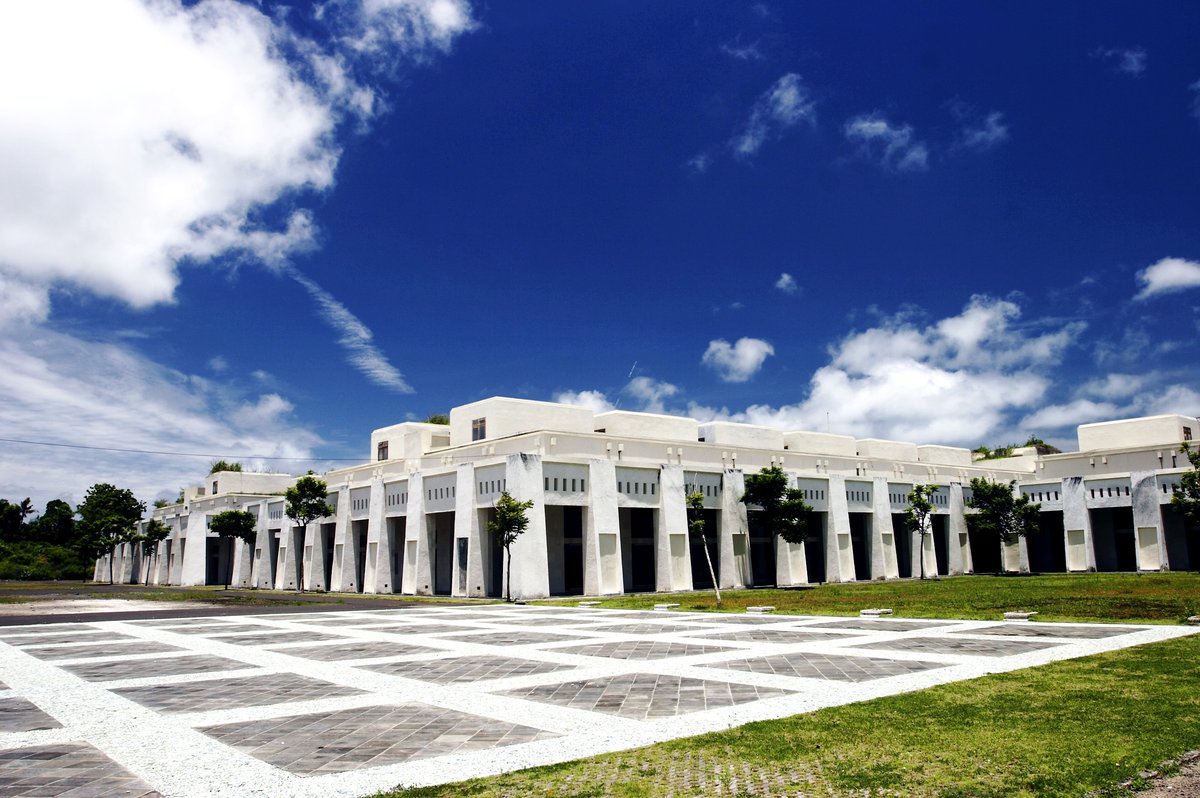
Garuda Wisnu Kencana: Visiting Hours, Tickets, and the Ultimate Guide to Bali’s Iconic Cultural Park
Date: 15/06/2025
Introduction
Located on Bali’s scenic Bukit Peninsula, the Garuda Wisnu Kencana (GWK) Cultural Park is a monumental testament to Indonesia’s cultural richness, spiritual philosophies, and artistic mastery. Dominated by the awe-inspiring Garuda Wisnu Kencana statue—depicting the Hindu god Vishnu riding the mythical bird Garuda—this park stands as a symbol of national pride and the harmonious interplay between the divine and the earthly. Conceived by Balinese sculptor Nyoman Nuarta in the early 1990s, the GWK statue, at 121 meters tall and with a 64-meter wingspan, is among the tallest and most impressive statues globally. Crafted from copper, brass, and steel, it is engineered to withstand Bali’s tropical weather and seismic activity (ekaputrawisata.com; Wikipedia).
The GWK Cultural Park covers approximately 60 hectares, blending monumental art with daily Balinese performances, lush gardens, exhibitions, and panoramic viewpoints. Facilities are visitor-friendly, with wheelchair access, shuttle services, and guided tours. Essential information such as visiting hours (typically 8:00 AM to 10:00 PM), ticket prices, and transportation options is easily accessible (official GWK website; ticket.gwkbali.com).
Nearby attractions such as Uluwatu Temple, Jimbaran Bay, and Padang Padang Beach round out a holistic Bali experience, combining culture and natural beauty. Whether drawn by its scale, spiritual symbolism, or cultural vibrancy, GWK is a must-visit historical site for anyone seeking to understand Indonesian heritage (Indonesia Sentinel; balitouristic.com).
Table of Contents
- Discovering Garuda Wisnu Kencana: A Must-Visit Bali Historical Site
- History, Vision, and Construction
- Cultural and Mythological Significance
- Visitor Essentials: Hours, Tickets, Accessibility
- Travel Tips and Nearby Attractions
- Park Layout and Main Attractions
- Events, Performances, and Experiences
- Frequently Asked Questions (FAQ)
- Conclusion and Practical Resources
Discovering Garuda Wisnu Kencana: A Must-Visit Bali Historical Site
In southern Bali, the GWK statue rises above the landscape not only as a feat of engineering, but also as a vibrant symbol of Indonesia’s cultural and spiritual identity. This guide covers GWK’s origins, cultural significance, visitor information, and practical tips to ensure a memorable visit.
History, Vision, and Construction
Conception and Vision: The idea for GWK was born in the early 1990s through Balinese sculptor I Nyoman Nuarta. Inspired by Hindu mythology, the statue depicts Vishnu, the universe’s preserver, astride Garuda, a mythical bird symbolizing strength and loyalty (ekaputrawisata.com; balitouristic.com).
Construction Timeline: The project began in 1997 but was delayed by the Asian financial crisis, halting work for 16 years. Construction resumed in 2013 and concluded in 2018, culminating in a spectacular landmark inaugurated by President Joko Widodo (Wikipedia; Indonesia Sentinel).
Engineering Feats: Standing 121 meters tall and 64 meters wide, the statue was constructed from 754 copper and brass modules supported by a steel and concrete core. Its durability enables it to withstand the island’s seismic and tropical challenges (Authentic Indonesia; Finns Beach Club).
Cultural and Mythological Significance
Symbolism: GWK represents the triumph of good over evil and the pursuit of wisdom. Vishnu embodies cosmic order, while Garuda, also Indonesia’s national emblem, stands for independence and unity (Indonesia Sentinel; Bali Nirvana).
Mythology: The statue’s narrative draws from the Mahabharata, where Garuda’s quest for the elixir Amrita symbolizes liberation and the power of devotion (Wikipedia).
Spiritual and National Pride: GWK is the world’s tallest Hindu deity statue, asserting Indonesia’s spiritual and artistic prominence. The park hosts regular ceremonies, traditional dances, and festivals, integrating cultural heritage into daily life (Indonesia Sentinel; Loengan).
Visitor Essentials: Hours, Tickets, Accessibility
- Hours: Open daily from 8:00 AM to 10:00 PM (official GWK website).
- Tickets: Adult tickets are around IDR 125,000–175,000; child tickets are approximately IDR 100,000–125,000. Prices may vary for special packages or performances (balirescentre.com).
- Purchase: Tickets can be bought online via the official GWK ticketing page or at the park entrance.
- Accessibility: Wheelchair-friendly paths, ramps, and shuttle services are available. Guided tours can be arranged for deeper insights (TravelTriangle).
Travel Tips and Nearby Attractions
- Best Time: Visit early morning or late afternoon for cooler weather and optimal lighting.
- What to Bring: Comfortable shoes, sun protection (sunscreen, hat, sunglasses), water, and a camera.
- Cultural Etiquette: Dress modestly in sacred areas; always ask before photographing performers or rituals.
- Nearby Sites: Uluwatu Temple (sea temple and Kecak dance), Padang Padang Beach (surfing and scenery), Jimbaran Bay (seafood and sunsets) (hallobalitraveldmc.com).
Park Layout and Main Attractions
GWK Park Zones:
- Central Monument Area: Features the GWK statue and plaza.
- Lotus Pond: Large open venue for events and relaxation.
- Performance Venues: Amphitheaters for daily Balinese dances and music.
- Art Spaces: Asana Artseum (interactive 3D art), rotating galleries, and workshops (TripPlannerIndonesia).
- Balinese House and Temple: Experience local architecture and spiritual practices.
- Gardens and Viewpoints: Landscaped areas and scenic vistas over Bali’s coastline.
- Dining: Jendela Bali Restaurant (Balinese cuisine), cafes, food stalls, and souvenir shops.
Main Statue Access: The “Top of The Statue Tour” (with select packages) grants access to an exclusive observation deck for sweeping views (TripPlannerIndonesia).
Events, Performances, and Experiences
- Daily Shows: Kecak, Barong, and Legong dances; Wayang Kulit (shadow puppetry).
- Annual Events: Indonesia’s Independence Day (August 17), Pesta Rakyat (community festival), and special culinary and cultural celebrations.
- Workshops: Batik painting, wood carving, mask-making, and other hands-on arts (tourism-in-indonesia.com).
- Atmosphere: The park blends lively cultural energy with tranquil gardens, suitable for all ages and interests.
Frequently Asked Questions (FAQ)
Q: What are the park’s opening hours?
A: GWK is open daily from 8:00 AM to 10:00 PM. Special events may affect hours.
Q: How much are tickets?
A: Adults: IDR 125,000–175,000; children: IDR 100,000–125,000. Check online for updated prices and packages.
Q: Is the park accessible for people with disabilities?
A: Yes, with wheelchair paths, ramps, and shuttle services.
Q: Can tickets be bought online?
A: Yes, visit the official ticketing page for online purchases.
Q: What are the best times to visit?
A: Early morning or late afternoon for pleasant weather and fewer crowds.
Q: Are guided tours available?
A: Yes, guided tours in multiple languages can be booked at the information desk or online.
Q: What should I wear?
A: Comfortable, modest clothing, especially if visiting sacred or ceremonial areas.
Conclusion and Practical Resources
Garuda Wisnu Kencana Cultural Park offers a unique blend of monumental artistry, cultural celebration, and spiritual immersion. With its towering statue, dynamic performances, lush gardens, and thoughtful amenities, GWK embodies the richness of Bali’s heritage. Plan your visit by consulting official resources, booking tickets in advance, and scheduling your day to enjoy both the park’s highlights and nearby attractions.
For the latest updates, ticket bookings, and event schedules, visit the official GWK website and ticket platform. Download the Audiala app for exclusive travel tips, and follow us on social media for news and offers.
Visuals and Media
- Interactive map and virtual tour: official GWK website
References
- Garuda Wisnu Kencana Statue in Bali, Ekaputra Wisata
- Garuda Wisnu Kencana Cultural Park, Wikipedia
- Exploring Bali’s Icon: The Garuda Wisnu Kencana Statue, Indonesia Sentinel
- The Biggest and Mightiest Statue in Bali, Bali Touristic
- GWK Cultural Park: Entrance Fees and Opening Hours, TripPlannerIndonesia
- Garuda Wisnu Kencana Cultural Park Bali, BaliResCentre
- Garuda Wisnu Kencana Cultural Park, TravelTriangle
- GWK Cultural Park Visitor Guide, Hallo Bali Travel DMC
- Exploring Garuda Wisnu Kencana Cultural Park, Tourism in Indonesia
- GWK Cultural Park Complete Guide, The Travel Author
- Garuda Wisnu Kencana Official Website
- Official Ticket Booking Page
- Garuda Wisnu Kencana Ticketing Platform
